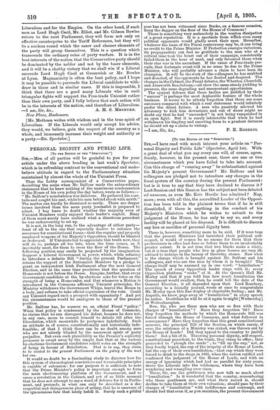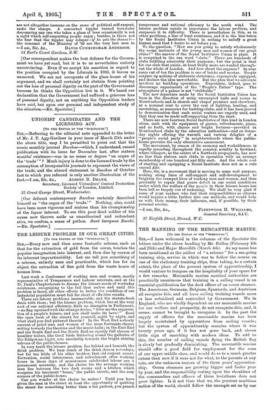SIR,—I have read with much interest your article on "
Per- sonal Dignity and Public Life" (Spectator, April 1st). With a great deal of what you say every one will, of course, agree. Surely, however, in the present case, there are one or two circumstances which you have failed to take into account. Can this charge of "running away" be substantiated against his Majesty's present Government ? Mr. Balfour and his colleagues are pledged not to introduce any changes in the fiscal system of the country during the present Parliament; but is it true to say that they have declined to discuss it ? Last Session and this Session has the subject not been debated ad nauseam, as even Mr. ICeir Hardie has admitted ? Nay, more ; even with all this, the accredited Leader of the Opposi-
tion has been told in the plainest terms that if he is still dissatisfied, if there is anything in the conduct of his Majesty's Ministers which he wishes to submit to the judgment of the House, he has only to say so, and every facility will be placed at his disposal. It is difficult to discern any loss or sacrifice of personal dignity here.
There is, however, something more to be said. If it were truo that the present Ministers had tarnished their political self- respect, it would of course be no excuse for them that their predecessors in office had done so before them to an incalculably greater extent. It is not true that two blacks make a white, but it is true that people who live in glass houses are very ill- advised to indulge in the luxury of throwing stones. Now what is the charge which is brought against Mr. Balfour and his colleagues, and who are the men by whom it is brought? The charge itself may be summed up in one word: "humiliation." The speech of every Opposition leader rings with it ; every Opposition platform " reeks " of it. At tho Queen's Hall Mr. Morley said that if you told him how much humiliation the Government would swallow, then he could tell the date of the General Election; it all depended upon that. Lord Rosebery, according to a friendly journal, wrote at once to congratulate Mr. Morley upon this fine display of charitable feeling ; and Mr. Asquith, we know, pegs away at "humiliation" in every speech he makes. Doubtless he will be at it again to-night [Wednesday] at Wolverhampton.
Now, Sir, who are these men who are so free with their charges of "humiliation" ? Have they forgotten '93 P ILavo they forgotten the methods by which the Home-rule Bill was forced through the House of Commons, and what followed in consequence ? Have they forgotten that this great constitutional measure, the principal Bill of the Session, on which surely, if over, the existence of a Ministry was staked, was thrown out by the House of Lords? Did they appeal to the country to justify them? Not a bit of it. Throwing personal dignity, self-respect, constitutional precedent, to the winds, they clung to office; they proceeded to "plough the sands" ; to "fill up the cup," not, as they fondly hoped, the cup of the iniquity of the House of Lords, but the cup of their own humiliation,—that cup which they were forced to drink to the dregs in 1895, when the nation ratified and confirmed the judgment of the House of Lords, and with an energy of ignominy which had had no parallel for sixty years, drove the Liberals into the wilderness, where they have been wandering and wrangling ever since.
These, Sir, are the gentlemen who now talk so much about "humiliation." Is it wonderful that the country, remembering who these gentlemen are, and what their record is, should decline to take them at their own valuation ; should pass by their charges of " humiliation " with indifference and contempt, and should feel that even if, as you maintain, the present Government
are not altogether immune on the score of political self-respect, make the charge. A converted tippler turned teetotaler denouncing any one who takes a glass of beer occasionally is not a sight which self-respecting people enjoy ; besides, is there not the fear that the tippler may relapse—if he gets the chance ?- the remnant of the Ministry of '93 are the very last men to —I am, Sir, &c., DAVID CUNNINGHAM ANDERSON.
[Our correspondent makes the best defence for the Govern- ment we have yet read, but it is to us nevertheless entirely
unconvincing. Even if we accept his assertion in regard to the position occupied by the Liberals in 1893, it leaves us unmoved. We are not occupants of the glass house of his argument, and we shall certainly not abstain from pointing out the loss of personal dignity on the part of the Government because he thinks the Opposition live in it. We based our declaration that the Government had suffered a grievous loss of personal dignity, not on anything the Opposition leaders have said, but upon our personal and independent study of the situation.—En. Spectator.]











































 Previous page
Previous page